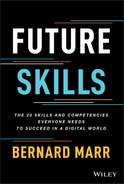FINAL WORDS
In this book, we've learned that understanding the impact of new technologies and being able to work confidently alongside these technologies is certainly an important part of success in the fourth industrial revolution. But over and above that, distinctly human skills like creativity and emotional intelligence will be more valuable than ever before.
What These 20 Skills Tell Us About the Future
When I look back over the chapters in this book, a few common themes jump out at me:
- Humility, in terms of recognizing our strengths and weaknesses so that we can grow and improve
- Optimism, that the ability to surf the wave of transformation is well within our grasp, and nobody need be left behind
- Self-confidence, in that anyone—literally anyone—can learn and improve in these skills
- Resilience, in knowing that these skills can help us successfully navigate whatever changes and challenges may be coming our way
- Taking the initiative, because many of these skills are ignored by traditional education institutions, so it's up to us to curate our own learning path
Just looking at these themes has me feeling optimistic about the future. So when people try to tell you that there's no future for humanity, that machines will take all our jobs, ask yourself: is that the vision of the future you get from this book?
Overall, I'd say the 20 essential skills point to a world in which work is more human, more meaningful, and more fulfilling. Yes, many jobs will evolve as new technologies promise to streamline and automate routine processes. And it may mean that your job title in 15 years' time hasn't been invented yet. The uncertainty that comes with all this change can be challenging, but isn't this vision of the future exciting—a future in which organizations value our very humanness, instead of expecting people to behave like machines? I'm in!
Where to Go from Here
Building the skills in this book will help you thrive in the fourth industrial revolution, and give you the confidence to successfully ride the wave of change. But where should you start?
I say start small. Trying to boost your knowledge of 20 skills at once will only lead to overwhelm. So identify the one, two, or three skills that matter most to you or are the biggest priority for your line of work. Make that your focus for this year. In fact, why not write a letter to yourself outlining the skills that you've prioritized and your learning action plan for the year ahead? (This might include reading books, signing up for online courses, finding a mentor, and practicing the tips and techniques I've highlighted throughout the book.)
Then, when the year is up and you've reviewed your progress, you can repeat the process with the next set of priorities. Build gradually. And do keep in mind that all of the skills in this book can be learned. So don't be tempted to dismiss any of these skills because “that's not my thing” or “I'm no good at that.” Remember the power of “yet”—as in, “that's not my thing yet, but it will be.”
Embracing the Road Ahead
Before we end, let's briefly cast our mind back to the previous industrial revolution, which began in the late 20th century and was driven by computerization. Computerization made work and life easier, created value-adding new jobs, and ultimately made the world a smaller, more connected place. (If your memory doesn't stretch back that far, you'll have to take my word for it.) Was it wholeheartedly embraced by everyone at the time? Of course not. But did it ultimately lead to better, easier lives for most people? Absolutely. This fourth industrial revolution will again make the world better and improve our lives—despite the many challenges that come with technology—by freeing up humans to focus our time and talents where they matter most.
For me, these 20 skills point to a future where we celebrate the amazing potential of humans—with all our creative, empathetic, interpersonal talents—to literally create the future we want, and tackle some of the biggest problems facing our world. If we harness our human talents, anything is possible.
Online Bonus ChapterI have written a bonus chapter to expand on the five human traits that are common themes running throughout this book. These traits underpin each of the 20 future skills:
- Optimism
- Humility
- Self-belief
- Resilience
- Taking the initiative
If you would like some more tips on how to improve these, you can access the bonus chapter at bernardmarr.com/bonus.
In return, I would really appreciate if you could write an online review of the book.
